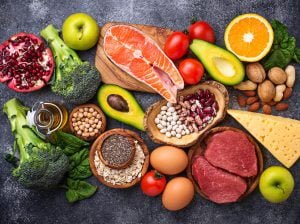A frequently suggested blog topic is the role of nutrition – foods and supplements – in the management of Parkinson’s disease (PD). (Feel free to suggest your own topic by clicking here). For a general overview of nutritional tips for someone with PD, I encourage you to view an excellent APDA webinar, Living Well Every Day, archived on our website. The webinar presents strategies, based on firm scientific evidence, that help support a healthy lifestyle for people with PD.
Spotlight on Parkinson’s Disease: Living Well Everyday
Featured Presenters: Lisa Sommers, MA, CCC-SLP and Stacey A. Zawacki, DrPH, RD
But beyond these general principles, many of you are curious about various claims that you have heard about particular foods or supplements to avoid for PD, particular foods or supplements to take for PD and specific diets to follow. There are many assertions out there about what is good or not good for PD, and it is hard to know what to believe or whether to change your diet based on these reports.
In this series of blogs, I am delving into some of these topics and analyzing what we know and what we don’t know as it relates to nutrition and PD. (As always, please consult your health care team to find out what is best for your particular situation.)
I divided my coverage of nutrition for Parkinson’s into three main topics to make it easier to digest (pun intended!):
- Part One: What we know and don’t know about avoiding particular foods/supplements.
- Part Two: What we know and don’t know about taking particular foods/supplements.
- Part Three: What we know and don’t know about adhering to particular diets.
Part One: What we know (and don’t know) about avoiding particular foods and supplements
In this blog, I will discuss foods to avoid in PD that are not related to interactions with Levodopa. For a full discussion on that topic, please see this article on food interactions with Levodopa.
Alcohol
Because people with PD may have an unsteady gait and balance impairment, they need to be more thoughtful about their alcohol intake than the general population. People should take a common-sense approach of limiting alcohol in mild PD, and being extra cautious if there are balance issues from PD. Social drinking for people with mild PD and no balance or gait issues is considered to be fine.

Tyramine
Patients who are taking medications for PD that are classified as monoamine oxidase (MAO)-B inhibitors (rasagiline, selegiline, and safinamide) are often concerned about having to adhere to a particular diet which is low in the amino acid tyramine. This is because patients who are taking non-selective MAO inhibitors (that inhibit both MAO-A and MAO-B) for reasons other than PD, such as depression, do have to be concerned about adhering to that diet (which can be difficult, as many foods contain tyramine). When MAO-A is inhibited, the body can no longer break down tyramine effectively. Elevated levels of tyramine can then cause spikes in blood pressure and other negative effects. To be clear, there are no medications indicated for PD that inhibit MAO-A. However, at high doses, MAO-B inhibitors can begin to inhibit MAO-A as well. When MAO-B inhibitors are taken at the recommended doses for PD, tyramine is broken down effectively and dangerous levels are not reached.
Because of this, a diet low in tyramine is not required for those taking MAO-B inhibitors at the recommended doses for PD. For example, the package insert for rasagiline (Azilect) reads:
“Dietary tyramine restriction is not required during treatment with recommended doses of Azilect.”
There is a caveat to this statement however which reads:
“However, certain foods that may contain very high amounts (i.e., more than 150 mg) of tyramine that could potentially cause severe hypertension because of tyramine interaction (including various clinical syndromes referred to as hypertensive urgency, crisis, or emergency) in patients taking Azilect, even at the recommended doses, due to increased sensitivity to tyramine.“
It’s important to note that 150 mg of tyramine is a lot and most foods that contain tyramine do not contain this high of an amount. Some foods however, if eaten in large enough quantities may reach these levels, and these include aged cheeses, cured meats, and beer on tap. Avoiding these foods is reasonable for someone on an MAO-B inhibitor.
Dairy
Population studies have shown a slightly elevated risk of PD in people who report high consumption of dairy, as compared to people who report low consumption of dairy. The reason for the association between increased risk of PD and dairy is not known. It is important to note that these studies do not address the effects of dairy on people who already have PD.

These studies demonstrate an association (meaning a small elevated risk of PD and dairy coexists) – but not a causation (that consuming dairy causes the elevated risk.) There may be an innocuous link between dairy and PD that explains the connection (e.g. just for argument’s sake – no data exists to suggest this – people who carry a genetic predisposition to PD also carry a genetic predisposition to enjoying dairy.) but that has yet to be discovered.
Two theories that have been suggested but not proven to explain the connection are that 1) dairy may contain a pesticide that contributes to PD risk or that 2) dairy may lower uric acid in the body, a substance which may be protective of PD.
On the other side of the argument is the fact that dairy serves as an excellent source of calcium, vitamin D and other essential nutrients. Calcium and vitamin D are vital to support bone strength which is necessary to decrease the probability of fractures in people with PD who may be prone to falls. Vitamin D deficiency specifically has also been linked to PD, so all things considered, it may be detrimental to people with PD to eliminate a dietary source of calcium and vitamin D.
The bottom line is that there is currently not enough information to make a particular dietary recommendation concerning dairy for people with PD.
Stay tuned next week for a discussion about what we know (and don’t know) about taking particular foods/supplements that are often talked about for people with PD.
Tips and Takeaways
- It is hard to sift through all the information on the internet about foods and supplements to avoid in people with PD. There are a lot of claims about nutrition and PD out there so it is important to consult credible sources.
- People taking monoamine oxidase-B inhibitors for PD such as rasagiline, selegiline and safinamide, do not have to adhere to a specific diet, but should avoid foods that are very high in tyramine such as aged cheeses, cured meats and beer on tap.
- Diets high in dairy have been associated with a slightly increased risk of PD. However, dairy products also have health benefits. All things considered, there is not enough information to recommend eliminating dairy products for people with PD.
- Discuss nutrition questions and concerns with your health care team to determine what choices are best for your personal situation.
Have a question about Parkinson’s disease?
Our Scientific & Medical Affairs Department can provide expertise and resources to answer your questions and address your concerns.
